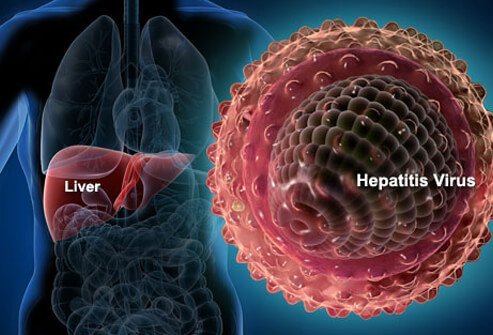Hepatitis is an inflammation of the liver. Alcohol use, various health conditions, and some medications can cause this condition. However, viral infections are the most common cause of hepatitis. In this article, we detail the different types of hepatitis, their common symptoms, causes, and how to treat and prevent the condition.
What is hepatitis?
Hepatitis refers to an inflammatory condition of the liver. It is most commonly the result of a viral infection, but there are other possible causes of hepatitis. These include autoimmune hepatitis and hepatitis that occurs as a secondary result of medications, drugs, toxins, and alcohol. Autoimmune hepatitis is a disease that occurs when your body makes antibodies against liver tissue.
The five main viral classifications of hepatitis are hepatitis A, B, C, D, and E. A different virus is responsible for each type of viral hepatitis. The World Health Organization (WHO) estimates that 354 million people from reliable sources are currently living with chronic hepatitis B and C worldwide.
Hepatitis A
Hepatitis A is the result of infection with the hepatitis A virus (HAV). This type of hepatitis is an acute and short-term disease.
Hepatitis B
Hepatitis B is caused by the hepatitis B virus (HBV). This is often an ongoing chronic condition. The Centers for Disease Control and Prevention (CDC) estimates that about 826,000 people are living with chronic hepatitis B in the United States and about 257 million people worldwide.
Hepatitis C
Hepatitis C comes from the hepatitis C virus (HCV). HCV is among the most common bloodborne viral infections in the United States and usually presents as a long-term condition. According to the CDC, approximately 2.4 million Americans are currently living with a chronic form of this infection.
Hepatitis D
This is a rare form of hepatitis that only occurs along with hepatitis B infection. Hepatitis D virus (HDV) causes inflammation of the liver like other strains, but a person cannot get HDV without an existing hepatitis B infection. Globally, HDV affects nearly 5 per cent of people with chronic hepatitis B.
Hepatitis E
Hepatitis E is a waterborne disease that results from exposure to the hepatitis E virus (HEV). Hepatitis E is found primarily in areas with poor sanitation and typically results from ingestion of faecal matter that contaminates the water supply. This disease is rare in the United States, according to the CDC. Hepatitis E is usually acute but can be particularly dangerous in pregnant women.
Causes of noninfectious hepatitis
- Alcohol and other toxins
Excessive alcohol consumption can cause liver damage and inflammation. This may also be called alcoholic hepatitis. Alcohol directly damages your liver cells. Over time, it can cause permanent damage and lead to thickening or scarring of liver tissue (cirrhosis) and liver failure. Other toxic causes of hepatitis include medication misuse and exposure to toxins.
- Autoimmune system response
In some cases, the immune system mistakes the liver for something harmful and attacks it. This causes ongoing inflammation that can range from mild to severe and often hampers liver function. It is three times more common in women than in men.
Common symptoms of hepatitis
If you live with a chronic form of hepatitis, such as hepatitis B and C, you may not show symptoms until the damage affects your liver function. In contrast, people with acute hepatitis may develop symptoms shortly after contracting the hepatitis virus. Common symptoms of infectious hepatitis include:
- fatigue
- flu-like symptoms
- dark urine
- pale stool
- abdominal pain
- loss of appetite
- unexplained weight loss
- yellow skin and eyes, which may be signs of jaundice

How hepatitis is diagnosed?
It is crucial to understand what is causing hepatitis in order to treat it correctly. Doctors will go through a series of tests to accurately diagnose your condition.
- History and physical exam
To diagnose all forms of hepatitis, your doctor will first take your history to determine any risk factors you may have. During a physical exam, your doctor may gently press on your abdomen to check for pain or tenderness. Your doctor may also check for inflammation of the liver and any yellowing of the eyes or skin.
- Liver function tests
Liver function tests use blood samples to determine how efficiently your liver is working. Abnormal results of these tests may be the first indication that there is a problem, especially if you don’t show any signs of liver disease on a physical exam. High levels of liver enzymes can indicate that your liver is stressed, damaged, or not working properly.
- Other blood tests
If your liver function tests are abnormal, your doctor will likely order other blood tests to find the source of the problem. These tests can determine if you have infectious hepatitis by checking for the presence of hepatitis viruses or antibodies that your body makes to fight them. Doctors may also use blood tests to check for signs of autoimmune hepatitis.
- Liver biopsy
When diagnosing hepatitis, doctors will also check your liver for possible damage. A liver biopsy is a procedure that involves taking a sample of tissue from your liver. A medical professional can take this sample through your skin with a needle, which means there is no need for surgery. They will usually use ultrasound as a guide during this procedure. This test allows your doctor to determine how the infection or inflammation has affected your liver.
- Ultrasound
An abdominal ultrasound uses ultrasound waves to create an image of the organs inside your abdomen. This test allows your doctor to take a close look at your liver and nearby organs. It can reveal:
- fluid in the abdomen
- liver damage or enlargement
- liver tumors
- abnormalities of your gallbladder
Sometimes the pancreas also shows up on ultrasound images. This can be a useful test to determine the cause of your abnormal liver function.
How is hepatitis treated?
Treatment options will vary depending on the type of hepatitis you have and whether the infection is acute or chronic.
Hepatitis A
Hepatitis A is a short-term illness and may not require treatment. However, if the symptoms cause a lot of discomforts, bed rest may be necessary. Also, if you experience vomiting or diarrhoea, your doctor may recommend a dietary program to maintain your hydration and nutrition.
Hepatitis B
There is no specific treatment program for acute hepatitis B. However, if you have chronic hepatitis B, you’ll need antiviral medications from a reputable source. This form of treatment can be expensive, as you may need to continue it for several months or years. Treatment of chronic hepatitis B also requires regular medical evaluation and monitoring to determine if the virus is responding to treatment.
Hepatitis C
Antiviral medications can treat acute and chronic forms of hepatitis C. Typically, people who develop chronic hepatitis C will use a combination of antiviral drug therapies. They may also need more tests to determine the best form of treatment. People who develop cirrhosis or liver disease due to chronic hepatitis C may be candidates for a liver transplant.
Hepatitis D
The WHO Trusted Source lists pegylated interferon alfa as a treatment for hepatitis D. However, this drug can have serious side effects. As a result, it is not recommended for people with liver cirrhosis, people with psychiatric conditions, and people with autoimmune diseases.
Hepatitis E
Currently, there are no specific medical therapies available to treat hepatitis E. Because the infection is usually acute, it usually resolves on its own. Doctors will usually advise people with this infection to get plenty of rest, drink plenty of fluids, get enough nutrients, and avoid alcohol. However, pregnant women who develop this infection require close monitoring and care.
Autoimmune hepatitis
Corticosteroids, such as prednisone or budesonide, are extremely important in the early treatment of autoimmune hepatitis. They are effective in about 80 per cent of people with this condition. Azathioprine (Imuran), a drug that suppresses the immune system, may also be part of treatment programs. People can use this with or without steroids. Other immunosuppressive drugs such as mycophenolate (CellCept), tacrolimus (Prograf), and cyclosporine (Neoral) can also replace azathioprine in treatment.

